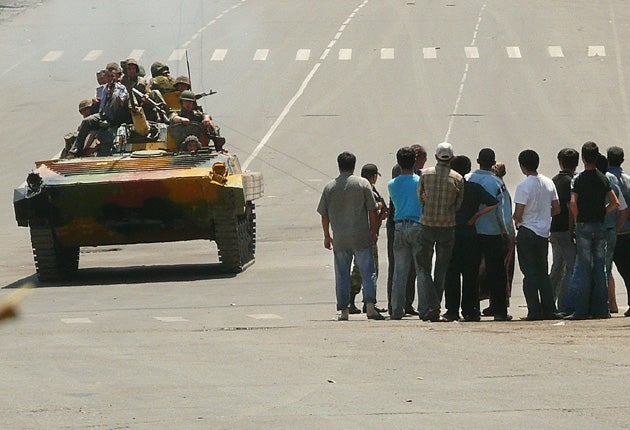Kyrgyzstan asks Russia to help quell ethnic clashes

Your support helps us to tell the story
From reproductive rights to climate change to Big Tech, The Independent is on the ground when the story is developing. Whether it's investigating the financials of Elon Musk's pro-Trump PAC or producing our latest documentary, 'The A Word', which shines a light on the American women fighting for reproductive rights, we know how important it is to parse out the facts from the messaging.
At such a critical moment in US history, we need reporters on the ground. Your donation allows us to keep sending journalists to speak to both sides of the story.
The Independent is trusted by Americans across the entire political spectrum. And unlike many other quality news outlets, we choose not to lock Americans out of our reporting and analysis with paywalls. We believe quality journalism should be available to everyone, paid for by those who can afford it.
Your support makes all the difference.Kyrgyzstan appealed for Russian help today to stop ethnic conflict that has killed at least 50 and left parts of its second-largest city in flames, the worst violence since the president was toppled in April.
The interim government in Kyrgyzstan, which hosts US and Russian military bases, said it was powerless to stop armed gangs from burning down the homes and businesses of ethnic Uzbeks in parts of Osh. Gun battles raged throughout the night.
"We need the entry of outside armed forces to calm the situation down," interim government leader Roza Otunbayeva told reporters. "We have appealed to Russia for help and I have already signed such a letter for President Dmitry Medvedev."
Kyrgyzstan, a poor ex-Soviet state of 5.3 million people, declared a state of emergency in Osh and several local rural districts early yesterday after rival ethnic gangs fought each other with guns, iron bars and petrol bombs.
The turmoil will fuel concern in Russia, the United States and neighbour China. Washington uses an air base at Manas in the north of the country, about 190 miles from Osh, to supply its forces in Afghanistan.
Russian Prime Minister Vladimir Putin and Otunbayeva discussed the situation in a telephone call today, the Russian government's press service said, without giving details.
A Reuters correspondent in Osh said gun battles had taken place through the night in an Uzbek neighbourhood. Gas was shut off to Osh and some neighbourhoods have no electricity.
"Entire streets are on fire," Interior Ministry spokesman Rakhmatillo Akhmedov said. "The situation is very bad. There is no sign of it stopping. Homes have been set ablaze."
Ethnic Uzbeks were fleeing to the border, said Farid Niyazov, spokesman for the interim Kyrgyz government.
One witness said some women and children had made it across to the Uzbek town of Marhamat, 38 miles from Osh, and camps had been set up for those without family in Uzbekistan.
A spokeswoman for the Kyrgyz Health Ministry said at least 50 people had been killed and 663 wounded in the violence, which is taking place in the southerly power base of former president Kurmanbek Bakiyev, deposed in April by a popular revolt.
"Everywhere is burning: Uzbek homes, restaurants and cafes. The whole town is covered in smoke," local human rights worker Dilmurad Ishanov, an ethnic Uzbek, said by telephone from Osh.
"We don't need the Kyrgyz authorities. We need Russia. We need troops. We need help."
The interim government sent in troops and armoured vehicles and declared a night-time curfew in Osh. But Niyazov said law enforcement bodies had been unable to quell the violence and would require reinforcement.
Kyrgyzstan, which won independence with the collapse of the Soviet Union in 1991, has been in turmoil since the revolt that toppled Bakiyev on April 7, kindling fears of civil war.
Supporters of Bakiyev, now in exile in Belarus, briefly seized government buildings in the south on May 13, defying central authorities in Bishkek.
While those clashes were motivated by politics, the latest violence has stoked fears of a repeat of the bloodshed in 1990, when hundreds of people were killed in ethnic-based clashes between Kyrgyz and Uzbeks in Osh.
Ethnic unrest is a perennial concern in the Fergana Valley, where Kyrgyzstan and Uzbekistan intertwine. While Uzbeks make up 14.5 per cent of the total Kyrgyz population, the two groups are split roughly equally in the Osh region.
On May 19, two people were killed and 74 wounded in clashes between Kyrgyz and Uzbeks in the city of Jalalabad. On the same day, Otunbayeva said she would rule the country until the end of 2011, scrapping plans for presidential polls in October.
Her interim government, which plans a national referendum on June 27 to vote on changes to the constitution, now faces a major test in trying to reassert control in Osh, said Lilit Gevorgyan, analyst at IHS Global Insight:
"The explosive combination of a counter-revolution and an ethnic conflict poses the greatest threat to the future of the Kyrgyz revolution."
Join our commenting forum
Join thought-provoking conversations, follow other Independent readers and see their replies
Comments